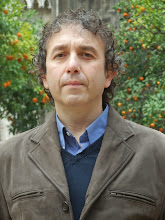-
UNLESS
is employed with the meaning IF NOT: Unless you study, you will not pass the
test. (If you don't study, you won't pass the test).
-
If can be replaced by after, before, until, till, as soon as, when, once, by the time and the moment: After you read this, you
will know the answer.
USES:
·
When
the action of the If-Clause is expected to take place: If you take care of your
shoes, they will last long enough (and you will probably take care of your
shoes).
MODIFICATIONS:
·
Present
Simple Continuous in the If-Clause: If he is sleeping, I will kill him.
·
Present
Perfect Simple in the If-Clause: If she has found my dog, I'll reward her.
VARIATIONS:
·
If
the action of the If-Clause is more doubtful or unlikely, SHOULD + BASE can be
used:
-
If
it should rain, we shall stay home
-
If
you should go, I shall be glad
·
This
construction is usually combined with the IMPERATIVE in the Main Clause:
-
If
you should see the teacher, tell her I am ill
-
If
you should go, do not say a word
·
IMPERATIVE
construction with CONDITIONAL meaning:
-
Do
not move or I will shoot = If you move, I will shoot
-
Keep
quiet and you will not get hurt = If you keep quiet, you won't get hurt
·
MODALS
such as CAN, MAY, MUST... can be used:
-
If
he comes in ten minutes, he can join us
TIME CLAUSES
(PROBABLE
/ LIKELY) (Future
Reference)
SUBORDINATE-CLAUSE: Present Simple MAIN
CLAUSE: Future Simple
Instead
of IF we use different conjunctions: As
soon as / By the time / The moment (that) / as long as / until / when / before
/ after ...
EXAMPLES:
He will forgive you as long as you are honest
The
situation will not improve until the government decides to act
SECOND
CONDITIONAL CLAUSES (IMPROBABLE /
UNLIKELY)(Present Reference)
IF-CLAUSE:
Past Simple MAIN
CLAUSE: Conditional Simple
EXAMPLE: If you studied, you would pass the test
If
he did not work, he would not get any money
-
No
difference if the clauses are reversed (except the comma): You would pass the
test if you studied.
-
If
a question, the Main Clause always first: Would you pass the test if you
studied?
-
UNLESS
is employed with the meaning IF NOT: Unless you studied, you would not pass the
test. (If you didn't study, you wouldn't pass the test).
USES:
·
When
the action of the If-Clause is not expected to take place: If she concentrated
very hard, she would understand the whole lesson (but she will not probably
concentrate very hard).
·
When
the assumption is different from the known facts: If I knew where the school
is, I would immediately tell you (but I don't know where the school is).
MODIFICATIONS:
·
Past
Simple Continuous in the If-Clause: If he were teaching at the moment, he would
be a great professor.
VARIATIONS:
·
COULD
/ MAY / MIGHT + BASE can be used in the Main Clause when the action is still
improbable but the possible result is being considered: We could / may / might
watch tennis this noon if the teacher let us earlier.
·
SUBJUNCTIVE
of TO BE: the PAST of TO BE is employed as the second Conditional Clause (WERE
is used with all subjects): If I were a rich man, I would be very happy.
·
'IF
I WERE YOU, I SHOULD / WOULD…' is a way of giving you a piece of advice: If I
were you, I should take care.
THIRD
CONDITIONAL CLAUSES (IMPOSSIBLE) (Past Reference)
IF-CLAUSE:
Past Perfect Simple MAIN CLAUSE: Conditional Perfect Simple
EXAMPLE: If she had let you her
car, you would have arrived on time.
If I had known the pub
was so far, I wouldn't have gone there.
-
No
difference if the clauses are reversed (except the comma): You would have
arrived on time if she had let you her car.
-
If
a question, the Main Clause always first: Would you have arrived on time if she
had let you her car?
-
UNLESS
is employed with the meaning IF NOT: Unless she had let you her car, you would
not have arrived on time
USES:
·
When
the action of the If-Clause is impossible to take place (when the events
referred to are in the past and, therefore, the condition cannot be fulfilled
yet: He would have been top of the class if he had worked harder (but he didn't
work hard so, he is not and cannot be yet, top of the class).
MODIFICATIONS:
·
Past
Perfect Continuous in the If-Clause: If he had been listening, he would have
heard the result.
VARIATIONS:
·
COULD
/ MAY / MIGHT + BASE can be used in the Main Clause expressing ability and
different degrees of possibility: If he had worked hard, he could / may / might
have passed the test.







